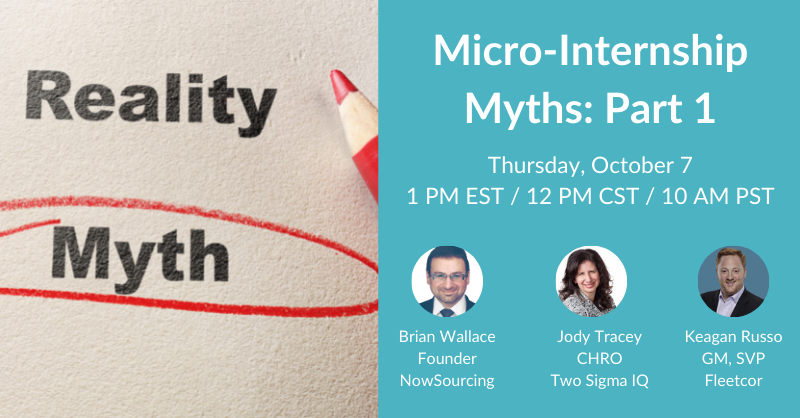
How 93% of college students want to engage with employers
It’s that time of year again: we’re gearing up to release our annual college student sentiment survey results covering not only how they want to engage with and learn about employers, but also how they view the most popular campus recruiting tactics. With the impact of the pandemic still unfolding, college students nationwide are (like most of us), burnt out on virtual events and eager for more opportunities to make one-to-one connections with recruiters and professionals. In fact, more than 93% of students rated "real work experience" as their preferred method of engagement with employers, allowing them to learn about potential roles, companies, and industries, including those they may not have otherwise considered.
We’ll let you know as soon as the full 2021-2022 Campus Recruiting Student Sentiment Report is available. In the meantime, we’re offering two opportunities to help you better understand how, why, and where Micro-Internships fit into the early-career talent pipeline. First, on October 7, we’ll host a panel of professionals that use Micro-Internships to discuss some of the most common "myths" about this experiential recruiting tool, and how it enhances existing campus recruiting strategies. Then, on October 14, we’ll hear from a panel of Micro-Interns for the student perspective on all things campus recruiting and why more meaningful opportunities to gain experience is top of mind for early-career talent.
Through both of these events, and our upcoming report, we’ll help you uncover and address some of the top challenges university recruiters are facing this year including:
- engaging and assessing high-potential candidates,
- attracting and converting diverse candidates,
- the continued shift towards virtual recruiting tactics, and
- early-career retention amidst “The Great Resignation.”
Michele Aymold, Vice President
Articles of the Week
Why Top Employers Should Hire Regional College Grads - Michael & Susan Dell Foundation
Next Steps, New Directions Emerge for Life Beyond College: Part 2 - Inside Higher Ed
Why a Liberal Education Is Worth Defending - Inside Higher Ed
Automated hiring software is mistakenly rejecting millions of viable job candidates - The Verge
Why Top Employers Should Hire Regional College Grads - Michael & Susan Dell Foundation
“When it comes to corporate America, it’s no secret that hiring managers are often drawn to a particular item on a resume: the applicant’s alma mater. From the Ivy League to flagship universities, there is a longstanding pipeline from these highly selective institutions to the country’s most prestigious and high-paying jobs...As these graduates are channeled into positions of power, it’s not hard to see how these hiring practices exacerbate educational and economic inequality. But what’s often overlooked is how these employers themselves are missing out.”
By effectively (though often unintentionally) limiting the candidate pool to only certain schools, companies miss out on "the grit and resilience [untapped] students demonstrate along the path to a college degree. They will do whatever it takes to achieve their goals." This article highlights why hiring managers and recruiters should focus more on students from regional colleges, rather than on academic pedigree alone.
Related reading: Company Voice: Attracting Talent to the Banking Industry
Next Steps, New Directions Emerge for Life Beyond College: Part 2 - Inside Higher Ed
“In light of virtual internship and alternative career exploration experiences that occurred (or did not) during COVID, what supports do students now expect and need?”
Students and employers were not the only stakeholders impacted by the shift to virtual during the first wave of the COVID-19 pandemic. Career services offices across the nation had to quickly pivot to continue to serve as a meaningful connection point for these two groups. In this latest data release from Inside Higher Ed, survey results highlight opportunities to improve virtual career development and exploration activities. External data from College Pulse highlights how traditional processes are difficult to simply migrate online, and the impact of trying to do so (e.g., struggles to read body language through a screen). This, coupled with Parker Dewey’s soon-to-be-released data, underscores that while the shift to virtual recruiting was expected to drive increased accessibility, many students from backgrounds underrepresented in the workforce still felt unable to participate in online recruiting events and activities that attempt to mimic traditional ones.
Related reading: College Recruiting: “Why Diversity Hiring Programs Are Failing Us”
Why a Liberal Education Is Worth Defending - Inside Higher Ed
“Without a robust liberal education, we cannot achieve educational equity.”
University of Texas at Austin professor Steven Mintz, reviews Roosevelt Montas’s forthcoming release Rescuing Socrates: How the Great Books Changed My Life and Why They Matter for a New Generation, and uncovers a powerful counterargument to the recent “apologies” for a liberal education. Specifically, Mintz points to Montas’ story in demonstrating how the American educational system has steered the working class towards vocational education, while promoting liberal education only for “the privileged and the pampered.” But Montas, and Mintz, argue that instead of a higher education focused on marketable skills, liberal education provides opportunities for transformation and growth, two keys to enabling students from all backgrounds to, “come to terms with life's travails and disappointments; and take charge of their own direction in life.”
Related reading: At the Core of Job Success: Why “Soft” Skills are Core Skills
Automated hiring software is mistakenly rejecting millions of viable job candidates - The Verge
“The exact mechanics of how automated software mistakenly reject candidates are varied, but generally stem from the use of overly-simplistic criteria to divide ‘good’ and ‘bad’ applicants.”
We featured coverage of this disheartening news a few weeks ago but felt it’s worth repeating. The unfortunate reality of tools designed to filter out candidates is that they are predicated on systems and programmed logic which excludes diverse, nontraditional, and underrepresented talent. This data also backs up the fact that resumes aren’t a true indicator of someone’s work ethic, skills, or growth potential—luckily, experiential recruiting tactics which not only enable candidates to participate as their whole selves, but also provide meaningful assessments for skills-based hiring are easier to implement and more scalable than ever before.
Related reading: Why Your Early-Career Recruiting Program Isn't Equitable And How You Can Fix It

Join us on Thursday, October 7th when we sit down with hiring managers and human resource professionals who have used Micro-Internships to share the benefits and value they received. During Micro-Internship Myths: Part 1, we'll discuss common concerns from recruiters about how, why, and where Micro-Internships fit into the early-career talent pipeline. Plus show you exactly how you can work with hiring managers (even those that are too busy to volunteer for career fair duty) to launch a pilot program this year!
Then on Thursday, October 14th, we'll host Part 2 of this conversation where students and recent graduates that have participated in Micro-Internships will share the value and benefits that short-term projects provided them.
For more stories and insights on HR, recruiting, and diversity, click here to subscribe to our weekly newsletter Hire Learnings.




